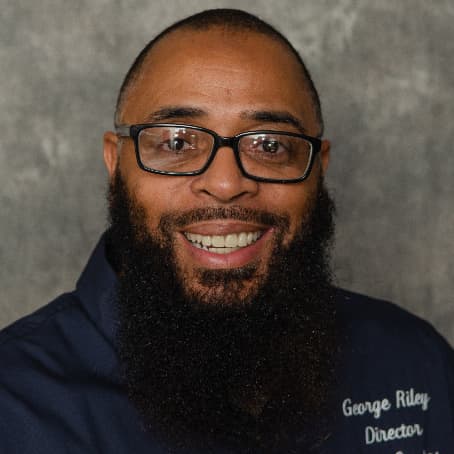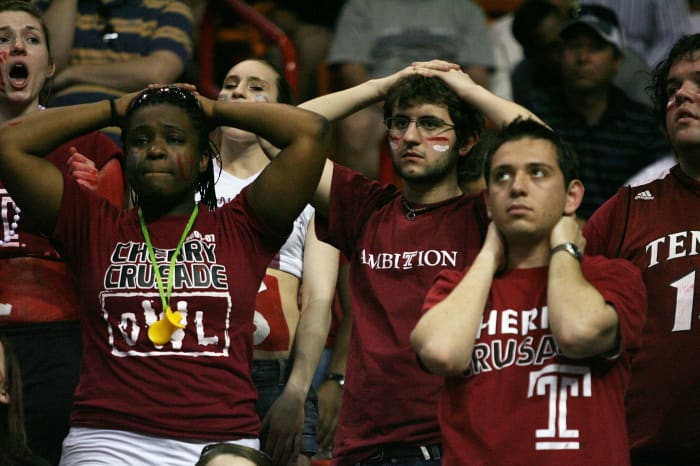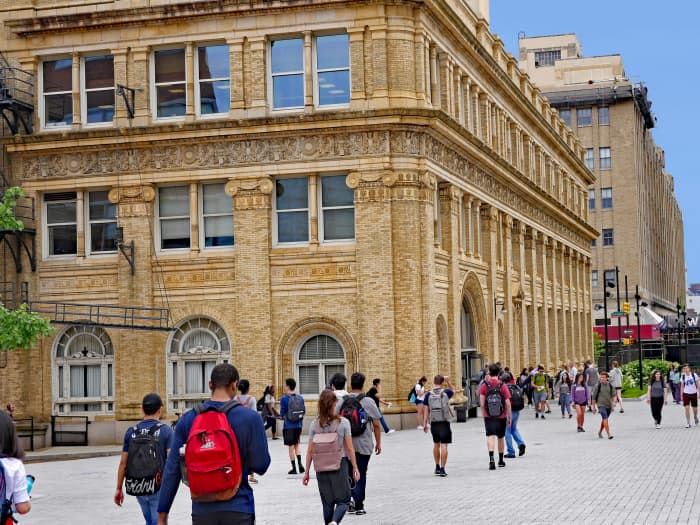This post was originally published on this site
When George Riley decided to attend the University of Pennsylvania, he went out and bought everyone in his family a hoodie or T-shirt emblazoned with the school’s logo.
Riley, who is now 59, was proud to study at the Ivy League school. Though he grew up and still lives in West Philadelphia, just a few miles from Penn, Riley said it could sometimes be hard to see beyond his neighborhood, which has some of the highest concentrations of poverty in the region. Riley hoped that by choosing Penn he could help his daughters imagine a future for themselves at a similar institution.
He also believed the master’s degree in organizational dynamics he planned to earn would improve his career prospects. By attending a graduate program Penn designed for working adults, Riley hoped to bolster his resume and maybe pivot to consulting. At the time he applied, Riley was working odd jobs after more than a decade overseeing summer and after-school programs for residents of subsidized housing.
For much of his time at Penn, Riley enjoyed his experience. But as he prepared for his planned 2018 graduation, Riley said he took on coursework recommended by academic advisors that left him liable to the school for $13,000 he couldn’t afford to pay.

George Riley was sued by Penn over unpaid tuition last year.
Courtesy of George Riley
In June 2021, Penn sued him in Pennsylvania state court. Two months later, a court administrator entered a judgment against Riley at the request of Penn, which could provide the school with the power to freeze his bank account to get back the $13,000 in tuition plus $423 in court costs. Riley says he doesn’t have the funds to pay. He now works at a nonprofit organization coordinating counseling, housing and case management for chronically homeless veterans, but his hours were initially cut during the pandemic. He never received a degree from Penn.
“The school itself made me better,” Riley said of Penn. “The bureaucracy, or collecting that money, that whole thing soured what would have been a life-changing experience.”
Riley is not alone. While the government has paused payments and interest on most federal student loans and frozen collection actions on all government owned or guaranteed student loans for nearly two years, some American universities and colleges have pursued former students who owe them money in court. The federal government has said its student debt payment pause is due to the unprecedented economic hardship caused by COVID-19, but consumer advocates in the Philadelphia area say universities in the region were quick to resume debt collection actions against former students during the pandemic. In some cases, these lawsuits were over unpaid tuition, in others they involved loans the schools extended to students.
A MarketWatch investigation showed universities ranging from a public state school to a nonprofit private research university to an Ivy League institution sued students in the Philadelphia region to collect debts during the pandemic. In total, MarketWatch found that the University of Pennsylvania, Rutgers University, Cabrini University, Drexel University, Temple University and other schools filed 106 debt collection lawsuits in state courts in 2021. Most of those lawsuits were filed by one law firm, a tiny debt collection specialist called Watson & Allard.
Laura Smith, a staff attorney at Community Legal Services of Philadelphia, said any time someone wakes up and finds they don’t have access to their bank account — a possible consequence of these lawsuits in states like Pennsylvania — “it can create a true emergency.” That’s particularly true during a health and economic crisis like the pandemic, she added.
Still, legal activity from area colleges continued. As COVID-19 spread, clients came to Smith’s organization seeking help with lawsuits and default judgments, a ruling in favor of a creditor after a defendant doesn’t respond to a lawsuit, Smith said. In states like Pennsylvania, such rulings can grant creditors the power to garnish a bank account or go after personal property.
“The lawsuits did not stop during the pandemic and neither did the default judgments or garnishments,” Smith said.
It’s not uncommon for colleges and universities to withhold transcripts or sue students to recoup unpaid funds. About 23% of the 454 institutions the National Association of College and University Business Officers surveyed in 2019 said they used litigation to collect unpaid bills. But these tactics have grown controversial in recent years because they derail students’ educational and financial progress.
Kevin Carey, vice president for education policy and knowledge management at New America, a think tank, said using the debt collection system to recoup unpaid funds raises questions about the societal role these schools say they serve, especially during a pandemic when the federal government has paused student loan collection and provided funds to colleges to help financially distressed students.
“These are non-profit institutions, should they be behaving like car dealers in terms of sending the repo man after you?” he said. “You’re supposed to be here serving a public mission, why are you doing this?”
***

Fans of Temple University, one of several schools in the Philadelphia area that took former students to court over debt last year.
Getty Images
On a single day in June 2021, attorney Gregory Allard filed 15 lawsuits at the state court located in Philadelphia’s giant masonary city hall topped with a statue of William Penn, the founder of Pennsylvania. Allard launched the lawsuits on behalf of the University of Pennsylvania and Cabrini University against former students of both schools, including George Riley.
Allard is the president of the Law Office of Watson & Allard, a firm based in a plaza of office condominiums near a pizzeria and a trampoline park in Glen Mills, Pa., a suburb about 30 miles southwest of Philadelphia. The firm lists three attorneys on its website, including Allard, and specializes in collecting debts. The firm proclaims its “extensive experience and success” recouping funds from students or former students on its website.
“Colleges and universities are no different than any other type of business in which unpaid accounts can have a significant detrimental effect on the bottom line,” the website reads.
Clients can choose whether to pay the firm on contingency or on an hourly basis, according to the firm’s website. Exhibits filed by Allard in court show when students at Cabrini and Drexel sign tuition contracts, they acknowledge that if they fail to pay they could be liable for attorneys and collections fees of about 33% of their balance due. Watson & Allard did not respond to multiple requests for comment.
Penn has a “defined process” for dealing with unpaid tuition, providing students with time to establish a payment plan without any collection fees, and large unpaid tuition accounts are referred to Watson & Allard only if a student fails to establish a repayment plan after several months, Ron Ozio, Penn’s director of media relations, wrote in an email. Due to the pandemic, the school implemented longer payment plans, eliminated fees for late payments and did not refer any cases to the collections process until the fall of 2020, he added.
Students who take on loans from Penn have the opportunity to request deferments and forbearance, according to the terms of the loan. After 120 days of delinquency, the loans are referred to collection agencies, including Watson & Allard. The firm attempts to contact students to establish a repayment plan and they will participate in mediation, Ozio wrote in the email.
“Lawsuits/judgments are a last resort and not something we pursue unless all other attempts to resolve the balance have been unsuccessful,” Ozio wrote. He added that the school periodically reviews its process to make sure its collection agencies are acting appropriately. “We will be doing this again in the near term.”
Last year, Watson & Allard sued at least 29 people on behalf of Penn. Many of the suits focused on money owed to the school for master’s degree studies. With an endowment of $20.5 billion as of June 2021, Penn meets the full demonstrated need of its undergraduate students without using loans. But some Penn students still go into debt, particularly those pursuing master’s degrees, which have become an increasing revenue source at universities.
“The lawsuits did not stop during the pandemic and neither did the default judgments or garnishments.”
In addition to the $1.7 trillion students owe in private and federal student loans, students who attended a variety of programs, ranging from community college to graduate school, are plagued by debts they owe to their schools. Consumer advocates and lawyers say the inability to repay these debts is sometimes due to a financial or other emergency that pushes students to drop out without paying their tuition bill. They may in some cases owe a parking or library fine. In addition to tuition bills, students may finish their degree, but struggle to pay back a loan extended to them by the college.
An estimated 6.6 million students owe as much as $15 billion to colleges they attended, according to a 2020 analysis from Ithaka S+R, a nonprofit research and advising group focused on higher education. Owing money to a school typically means that a student can’t enroll in more classes and can’t have access to their transcript, which can make transferring to another institution or using the credential for employment purposes nearly impossible.
Some colleges will go beyond holding transcripts to try to recoup the funds. They may use an internal collections process, or, as in the case of the Philadelphia-area universities, they take advantage of the same remedy a credit card company, hospital or auto lender would use — hiring a collections firm to sue students.
Mark Huelsman, director of policy and advocacy at the Hope Center for College, Community, and Justice at Temple University, said the filing of these lawsuits during the pandemic is “a reminder that student debt is a problem in many ways on a monthly basis or on a short-term basis even as federal student loan payments are paused.” He added: “It’s hitting people at the time they should be receiving relief from all of their debts and financial obligations.”
The suits in the Philadelphia area come at a time when some policymakers and colleges are revisiting these policies. At the federal level, Secretary of Education Miguel Cardona has urged colleges to reconsider practices like transcript withholding and the Consumer Financial Protection Bureau announced in January that it would scrutinize loans schools extend directly to students. Some states have banned the practice of transcript withholding and in cases where state officials are responsible for collecting on these debts, some have stopped sending outstanding student balances to for-profit debt collectors.
Some schools are even canceling money owed to them. At the Community College of Philadelphia, which sits roughly two miles east of Penn and Drexel, officials wiped away $2.75 million in outstanding account balances that about 3,500 students incurred during the pandemic. CCP was one of several community colleges, Historically Black Colleges and Universities and regional public colleges to do this after the Department of Education gave institutions the flexibility to use federal relief funds to cancel those debts.
But some schools went in a different direction. For example, a former Cabrini student with an outstanding tuition balance of $10,077 was sued in November and faced collection and attorney’s fees of a minimum of 33% of the outstanding balance, according to court filings. The former student was one of at least 15 people that court filings show Cabrini sued last year. In those cases, Watson & Allard represented the Catholic liberal arts college.
The school “takes a proactive and sincere approach” to its students’ and former students’ financial challenges, James Cooper, the school’s vice president of finance and administration, wrote in an email. Cabrini only refers debts to an external collections agency after multiple attempts to contact the person, including through phone, regular and certified mail and email, Cooper added. In addition, a portion of the $4.5 million in relief funds the school awarded to students went to former students who were enrolled during the pandemic, he said.
“Current tuition payments are critical to the University’s ability to provide financial relief to future Cabrini students and maintain its commitment to academic excellence,” Cooper wrote.
Other students sued by their former schools in the Philadelphia area had their lives seriously disrupted during the pandemic, according to interviews with the students and consumer attorneys. The mother of a former Penn student took funds from her 401(k) to pay off the debt her daughter owed to Penn and resolve a lawsuit filed in Pennsylvania state court. Another former Penn student described an officer from her local sheriff’s department knocking on her door at 6 a.m. to serve her the lawsuit papers even as her husband’s hours were cut significantly during the pandemic.
At Temple, the school “generally ceased collection-related lawsuits early last year” due to the pandemic, Stephen Orbanek, a school spokesman, wrote in an email. “However, there were rare and unique circumstances where we pursued action,” for example if someone repeatedly broke repayment plans.
***

The campus of Drexel University, which sued at least 31 former students in 2021.
Getty Images
In the summer of 2021, Nastassia Cowell, a 33-year-old single mom and former Drexel student, was trying to pay for groceries when she learned her bank account was frozen. Watson & Allard, which had sued her in February 2020 in Pennsylvania state court on behalf of the school over a $2,300 Perkins Loan, had started to target Cowell’s savings.
Under the now-defunct Perkins program, colleges received money from the federal government to lend to students with demonstrated need if the schools put up some funds of their own. Colleges are responsible for doling out and collecting the funds, which the colleges keep to make new loans. Now that the Perkins program has ended, colleges are required to pay back the federal share of the loan funds, which is 75%. The Department of Education did not require colleges to pause payments and collections during the pandemic on Perkins loans that the schools hold, but the agency gave colleges the flexibility to pause payments and involuntary collections on Perkins loans during the pandemic emergency.
Still, Drexel continued to press its case against Cowell over the Perkins Loan over the last two years. In October 2020, Drexel successfully requested for a court administrator to enter a default judgment against her. That put her at risk of not being able to afford basic expenses, including the insulin she uses to treat her type 1 diabetes.
“Without insulin, I’m basically nothing,” Cowell said.
Cowell describes last summer when she was trying to cope with her frozen bank account — including with calls to the collections firm, and Drexel — as “a really, really hard time in my life.” She phoned a suicide hotline, “crying my eyeballs out,” and spoke to the person who picked up for hours. “I was explaining to her that I feel like every corner I turn, no matter what I do, it was just another thing in my way,” Cowell said. “I was explaining to her that Drexel had taken so much from me and left me literally nothing.”
Cowell enrolled at Drexel to study nursing in 2012. She worked multiple jobs while she was a student there, taking up time she would have otherwise spent with her daughter, but still had to borrow around $60,000 to pay for school. Even those loans weren’t enough for her to foot the bill. Two semesters before Cowell’s planned graduation, she was told she needed to pay a balance or wouldn’t be able to enroll the next semester. Cowell couldn’t afford to do it, so she left without her nursing degree. She moved to Georgia to live with her sister and says she entered into a payment plan over the debt.
Drexel sued at least 31 people last year, court filings show. In at least 25 of those cases, the school was represented by Watson & Allard. When MarketWatch contacted Drexel, the school initially said it “suspended third-party debt collection for all outstanding accounts from March 2020 to December 2021.”
After MarketWatch presented Drexel with a list of lawsuits filed on behalf of the school in 2021, Drexel said it “suspended referrals to third parties for debt collection for all outstanding accounts during the time frame indicated.”
“Drexel University does not comment on individual cases, or cases in litigation,” a statement from the school reads.
In its initial response to MarketWatch, Drexel said it “works diligently to educate students before they enter any financial agreement, or apply for loans,” and offers guidance to students about those commitments. They also work with students with an outstanding balance to “come to a mutually agreeable solution,” including through flexible repayment arrangements, before turning to collections.
“Drexel University supports its students in creating an appropriate and sustainable financing plan before, during and after their time at Drexel,” the school said in its statement.
The non-profit private research university, whose endowment surpassed $1 billion in 2021, neighbors Penn in an area dubbed University City. It’s known for its cooperative education, or co-op program, in which students take part in professional, often-paid, employment on their path towards earning a degree. That focus on career preparation harkens back to the school’s founding in 1891 by Anthony J. Drexel, a banker, with the goal of preparing students for an increasingly industrialized society.
Today, consumer attorneys in the Philadelphia area say Drexel’s approach to recouping money owed by its former students can be extreme. They pointed to the school attempting to collect on unpaid tuition debt following a personal bankruptcy — a practice MarketWatch confirmed in a review of court documents filed in the years before the pandemic.
Whether the unpaid tuition bills are still collectible following a bankruptcy is legally murky territory, said John Rao, an attorney at the National Consumer Law Center. A 2002 decision in the federal third circuit court of appeals, which covers Pennsylvania, found that a student’s decision not to pay tuition doesn’t constitute a loan that would be non-dischargeable in bankruptcy.
But many of the decisions establishing the idea that unpaid tuition isn’t a loan are from several years ago, said Rao. “It wouldn’t surprise me that schools have gotten a little clever” in the intervening time in trying to make their tuition agreements look more like loans, he said.
In Drexel’s case, consumer attorneys like Kerry Smith, a senior staff attorney at CLS of Philadelphia, have pointed to a clause in the electronic document students sign assuming financial responsibility for their tuition, which says the tuition balance is “considered a Loan for Educational Purposes,” as a tactic the school is using to make it easier to collect on unpaid tuition following a bankruptcy. Drexel did not comment when asked about the purpose of the provision.
In at least one case where Drexel extended a loan to a student that was clearly not dischargeable in bankruptcy court, the school sued to collect on the loan just a few months after the borrower’s bankruptcy proceeding — which stays all lawsuits — closed.
When Drexel initially extended a $2,000 loan to Rachel Fingles in the middle of law school, she was grateful because she needed the money to make ends meet while she and her then-husband were finishing law school. By the time Fingles graduated a semester early from Drexel in 2010, the country was in the midst of a sluggish economic recovery following the Great Recession. Fingles found a job, but eight months later the firm was acquired and she was laid off. She was in and out of the legal industry for a few years as she balanced work with caring for her daughter.
These challenges meant she couldn’t afford the payments on the Drexel loan. Then Fingles and her husband got divorced while she was pregnant, throwing her financial life into disarray. She moved in with her parents and decided to file for bankruptcy. During the period she was in bankruptcy, Fingles was able to find a job as a lawyer that was both full-time and offered her flexibility to care for her two kids. That drastically improved her financial situation.
“As soon as the bankruptcy ended, I got sued by Drexel,” she said. “The purpose of the bankruptcy was to help me get my finances together. A single letter from them at this point in my life would have resolved the entire matter.” The lawsuit sought interest, attorney’s fees and court costs in addition to the principal balance, ballooning the amount she owed. “I was furious,” she said.
Fingles has come to an agreement with Watson & Allard, which was representing Drexel, to pay $4,000 through a payment plan.
“I am very grateful for the education and support I received at Drexel Law School,” Fingles wrote in an email. Overall, she looks back fondly on her time at Drexel. “I am highly disappointed that the financial institution chose to sue over $2,000 instead of reaching out one last time to try to resolve it.”
***

The 2016 commencement ceremony at Rutgers University. New Jersey’s main state school sued at least 20 people last year.
Getty Images
For Jeffrey Beneducci, the experience of being sued by Rutgers changed the way he viewed New Jersey’s flagship public college, which serves over 50,000 undergraduate students across its three campuses. The school sued Beneducci, 29, last year in New York state court. In 2021, Rutgers, represented by collections attorneys, sued at least 20 people, mostly in Pennsylvania and New Jersey. In 13 of those cases, Watson & Allard represented the school.
Rutgers’s case against Beneducci was over $6,000 he borrowed from the school in the 2014 academic year after his mother died of cancer and he was frantically searching for a way to pay for his last year of college.
“Even if I knew everything that it entailed, I would have signed everything because I was desperate to move on,” he said. At the time, Beneducci qualified for the maximum Pell grant, the funding the government provides to low-income students to pay for college. He says he didn’t even realize that one of the sources of funding was a loan issued by Rutgers directly.
Beneducci enjoyed his time at Rutgers so much that he enrolled there for a master’s degree in political science and government, during which time his loans were paused. Once he graduated in 2019, Beneducci first found an internship and then full-time work, but neither job paid particularly well. He wasn’t focused on his student loans at first because they were in a grace period and then because of the pandemic.

Jeffrey Beneducci was sued by Rutgers in 2021.
Courtesy of Jeffrey Beneducci
Beneducci said he learned he was being sued by the school when someone knocked on the door of his apartment in the New York borough of Staten Island in the summer of 2021 and served him with the court papers. Rutgers was demanding nearly $8,000 after factoring in interest, collection costs and late fees. His reaction to the suit: “In a word, panicked,” Beneducci said.
Rutgers can’t comment on individual cases, but the school works closely with former students to resolve outstanding balances, including through setting up payment plans, Dory Devlin, a university spokesperson, wrote in an emailed statement. Devlin wrote that debt the school transfers to collection agencies has been past due for nearly five years on average and Rutgers only sends the account to these third parties “after not being able to make arrangements with the students and former students.”
During the pandemic, the school “made unprecedented changes to help ease the financial burden of all our students and their families,” Devlin wrote, including removing holds on records and transcripts related to spring 2020 accounts and only placing the hold back on the account, if appropriate, in fall 2020. The school will also provide transcripts to students who have account holds if the documents are needed for employment applications, she wrote.
Ultimately, Beneducci and the law firm representing Rutgers agreed to a payment plan that now has Beneducci paying $50 per month. A $1,500 cushion from a GoFundMe a friend started on his behalf was one of the main factors that made Beneducci feel able to start paying the loan back.
“It’s hard to put into words how frustrated — and I kind of keep coming back to the word betrayed — I feel,” Beneducci said of the experience of being sued by his college during a challenging time for him and the world. “It’s mind-blowing that a place that is supposed to be an institution of education, and a place that tells you they’re going to try to help make anything possible for you, can be just so callous.”



